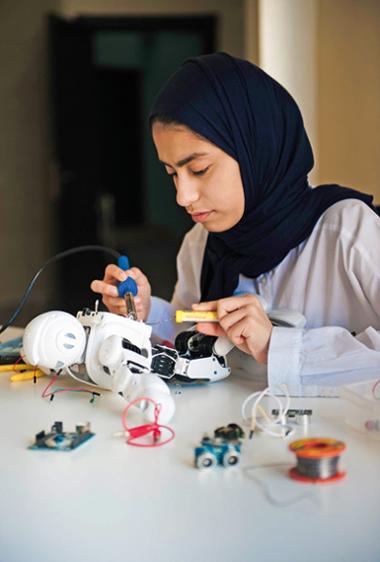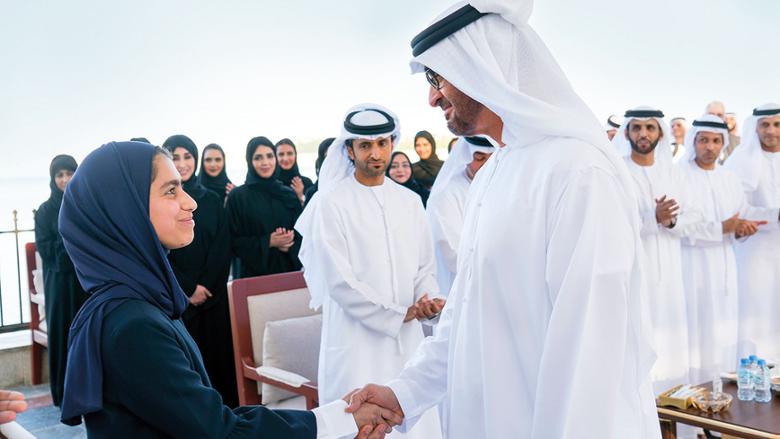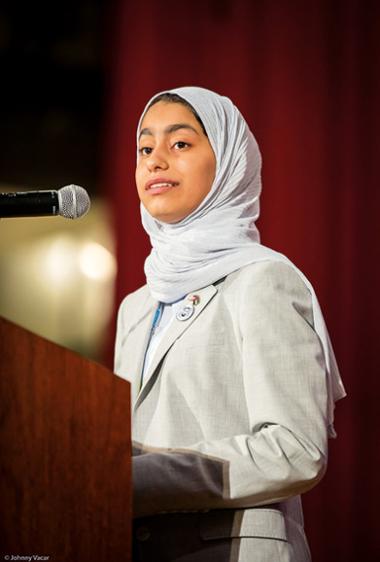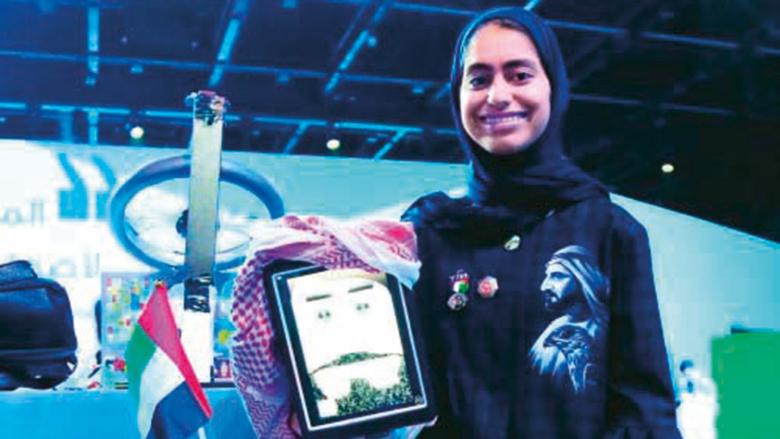Meet the UAE’s youngest inventor
To mark Emirati Women’s Day, Sangeetha Sagar spoke to the UAE’s youngest inventor, Fatima Al Kaabi, an 18-year-old who builds robots and smart devices and now plans to open her own AI company
To many people, the idea of being an inventor seems bizarre, says Fatima Al Kaabi, when I ask about her journey of discovery so far. “Many young people imagine an old man in a suit inventing.”
And if the word inventor, just like the word scientist, brings to mind the image of a middle-aged male, Fatima couldn’t be further from that stereotype. Even before she was legally allowed to drive, she had bagged the title of the UAE’s youngest inventor, at just 13.
Fatima was 10 when she built her first robot – one that could take pictures. She soon expanded her repertoire of inventions, one more impressive than the other. Think a solar charging bag for devices, a robot called the teleporter that attends school in place of sick children, an electronic belt for the hearing impaired, and a smart steering system that stops people from texting while driving.
Her efforts didn’t go unrecognised; in 2015, the now 18-year-old student who is pursuing an undergrad degree in computer engineering from Virginia Polytechnic Institute and State University in the US, was awarded the title of the UAE’s youngest inventor by His Highness Shaikh Mohammad Bin Rashid Al Maktoum, Vice-President and Prime Minister of UAE and Ruler of Dubai, at the Pioneers of UAE award ceremony.

Fatima has since been an inspiration to youngsters around the world, sharing her story with thousands of students, in more than 35 schools across the UAE and around the world. She’s hosted hands-on workshops and joined panels and has also given a TED talk.
But Fatima counts her greatest achievement as the ability to pave the way for other women and girls to pursue innovation and Stem. “I think we girls have the ambition but unfortunately lack the support,” she says.
Starting young
Fatima’s passion for science and inventing was honed from a very early age. Growing up, she enjoyed watching sci-fi, documentaries and shows on technology and innovation. “How It’s Made’ TV programmes were my favourite,” she says. This exposure combined with parents who encouraged an interest in Stem subjects and her love for robotics meant Fatima quickly became invested in innovation and inventing. When she started showing interest in robotics at the age of seven, her parents bought her robotics kits from toy stores and helped her build small simple projects.
“Unfortunately,” says Fatima, “at the time there weren’t a lot of resources or workshops that welcomed young children, especially girls, and taught them how to build projects and code, so I turned to the internet, specifically YouTube, to teach myself all the skills I needed.”
This gender disparity was one that has played out through the years for Fatima. “Many young girls and women decide to pursue Stem but the scarcity of role models, representation and guidance lead many to drop out of programmes or switch to a different career path,” she says. “As an engineering student today, I have seen the sexism women face in classrooms and the lack of representation in curriculums first-hand. I can’t recall a single lesson where we have learnt about or discussed a female inventor. I grew up with almost zero representation or any role models like me that I could look up to, so I see why many women do not consider pursuing a career in Stem.”

Besides the lack of opportunities for young girls, Fatima also faced some backlash simply for being a girl interested in Stem. “I wasn’t very welcomed by many people who thought I was unfit of certain opportunities, or still had old-fashioned ideas of what women can and can’t do,” she says.
Luckily for Fatima, her family stood firm behind her. “I grew up in a household with parents in the Stem field. My father is an engineer and my mother is an IT major. Seeing them passionately speak about their work at the dinner table or them explaining to me how things worked around the house got me engaged and interested in Stem.”
There’s been an evolution since. Over the years, she says she’s been overjoyed to have witnessed a transformation in the gender gap where women have always been at a disadvantage. “There are many resources today that young children, specifically girls, can use to educate themselves and build their skillset. Also, now, as a society, we have progressed from the old sexist ideals and opened the doors for women and girls in technical fields.”
The title of the UAE’s youngest inventor cemented it all for her. “It opened many doors for me and allowed me to grow as an inventor and has helped me gain some validation in places where I have been seen unfit, even if it came with a lot of responsibility. I am honoured and privileged to carry that title, especially as it came from His Highness Shaikh Mohammad. Getting the support and recognition from the government has been one of the highlights of my journey.”
Not the first
Fatima isn’t the first Emirati woman scientist to say that, and she won’t be the last. As we celebrate Emirati Women’s Day today, the UAE government’s contribution to encouraging women in the field has been immense. Scientists ranging from Dr Habiba AlSafar, director of Khalifa University’s biotechnology department, to Dr Hanifa Al Beloushi from Masdar Institute known for her work in eco-friendly biodiesel production, have spoken about the huge endorsement of women from the UAE’s leaders.

A 2018 Times Higher Education report states that more female students enrol for Stem subjects than men in the UAE. Dr Habiba attributes these statistics to a government that empowers women through policies, opportunities and ensuring female role models are part of science textbooks.
Sarah Amiri, Emirates Mars Mission’s deputy project manager and science lead in a team that is 35 per cent women, says more representation of women in science and technology in the UAE is contrary to studies that have been done internationally. “I think it’s because there wasn’t any distinguishing when it came to universities; they were open to women, and the support that they were given for tertiary education was the same as the support given to men; in some cases, women were even subsidised more to enter universities and stay in those fields that aren’t dominant.”
Fatima, in turn, says she is looking forward to the time when her title can be passed to another ambitious young inventor. And for these ambitious young inventors, she’s determined to do all she can. She is all praise for companies that have initiated CSR activities to provide young students with a platform to explore more Stem opportunities. So when air-conditioning solutions provider Taqeef launched the 2020 edition of the Stem learning programme iMatter, Fatima knew this was something she needed to be a part of somehow.
Designed to help students put theory into practice and familiarise themselves with Stem’s role in the jobs of the future, iMatter tasked students with finding solutions to real-world climate issues. “The programme had some of the most brilliant young minds with great ideas,” Fatima says. “I jumped at the opportunity of being a speaker at their virtual event. I filmed a video sharing some pieces of advice and insight, which Taqeef then surprised the finalists of the challenge with. I was glad to know the children enjoyed my speech and learned a few things from it. I was even more ecstatic when I got a few video responses from the participants who shared their experiences, insights and gratitude.”
Programme such as iMatter have made it possible for more students “especially from charity-based and less well-resourced schools across the country to experience Stem learning,” she says. “If governments, businesses and the society join hands to promote Stem education and welcome more opportunities, then definitely we can make a huge difference and produce more scientists, innovators, and entrepreneurs in the coming years.”
She’s thoroughly enjoying her journey in Stem, interspersing that with hobbies that range from art – “drawing illustrations and creating my own zines [homemade publications]” – to learning to play a new musical instrument. Now, she’s concentrating on college – she’s in her second year. “Alongside that, I have been focused on getting some of my new ideas patented. I hope to get a Master’s and PhD in Artificial Intelligence. I also aim to start my own AI company in the future and become an AI professor.”

She doesn’t share people’s wariness on AI and its impact on humanity. “Although it seems scary to many, I think AI will transform our world in ways we cannot imagine. I think with the introduction of AI in the workforce and our world, we will place value in human interaction and connections and move away from our routine tasks and jobs.”
Fatima is quick to assert that the idea of inventing is very simple and can be done every day in our lives, and by anyone. “As I mentioned in my TED talk, anyone can be an inventor and it doesn’t take a certain skill set or access to money or resources to do that.”
What she considers crucial right now is pushing the envelope of gender roles, engaging girls and women in Stem and providing them an environment to thrive in. “I think amplifying stories of women inventors and just recognising the struggles we face can make a big difference.
“We as a society need to encourage each other and be support systems for today’s young women pursuing Stem. Hopefully, with the exposure of representation on TV and in curriculums, we can create a new generation of talented women in Stem.”